Cathy Bryant's Blog: CatBryant.com ~ Journey Blog, page 71
December 1, 2012
On the 1st Day of Christmas . . . Texas Roads eBook!

Isaiah 7:14 ~ Therefore the Lord himself will give you a sign: The virgin will be with child and will give birth to a son, and will call him Immanuel.
Matthew 1:22-23 ~ All this took place to fulfill what the Lord had said through the prophet: 'The virgin will be with child and will give birth to a son, and they will call him Immanuel'--which means, 'God with us.'
In honor of this awe-inspiring and wonder-filled time of year, I want to give a few Christmas gifts, starting with the first day of Christmas...okay, well, December. =) You might want to check out the particulars here, but please remember that the more people who participate, the more books (eBooks, print, and an Amazon gift card and Kindle!) I'm giving away. So please share this with everyone you know who might be interested. Also the prizes are transferable if you'd like to pass on your prize to someone else as a gift.

Up for grabs today is a digital copy of the first book in the Miller's Creek novels, Texas Roads. Here's the back cover blurb:
One secret kept, another uncovered . . .
Dani Davis longs for a place to call
home. With quaint country charm, quirky residents, and loads of business
potential, Miller’s Creek, Texas seems like the perfect place to start
over . . . except for the cowboy who gives her a ride into town. Then
malicious rumors and a devastating discovery propel her down a road she
never expected to travel.
If we get up to thirty different comments from thirty different people, I'll give away just one copy, but if we hit between 31-60 comments, I'll give away two copies, and if we hit over sixty comments, I'll give away three! There are ways to get extra chances to win. You'll find them in the Rafflecopter below. (Side note: I was going to use random.org to choose the winner, but came across Rafflecopter to use instead. Don't worry. Winners are still chosen randomly.) I'll choose the winner(s) tonight at 10p.m. (CST) and announce the results in tomorrow's post. Changed my mind on this to allow e-mail subscribers to enter. I'll announce all the winners on December 14th.
Don't forget to share the news about the giveaway, and if you're a blogger feel free to share the giveaway button in the side bar on your blog with a link to the giveaways. (Then let me know in the regular comment section with a link to your blog and I'll give you yet another chance to win.) And don't forget to come back for our 2nd Day of Christmas giveaway . . . an eBook of A Path Less Traveled (book 2 in the series).
So sorry for the glitches! Apparently, the Rafflecopter is NOT working. Please feel free to leave your comments in the regular comment section and I'll tally them the old-fashioned way using random.org. Thanks!
a Rafflecopter giveaway









Published on December 01, 2012 03:00
November 30, 2012
Novel-Writing 101: Must-Have Middles
Welcome to the second article of three to go into deeper detail about story structure. If you missed the overview article I wrote on story structure, you can find it here. And if you missed the first article of this series on Bright Beginnings, you can read it here.
While the beginning is what will sell the story to your readers, its unwise to underestimate the importance of the middle. All-too often writers concentrate on the beginnings and endings, which leaves the middle in a muddle. The second act of the three-act story structure in where the real heart of the story begins. The middle is what gets your characters and your story to the ending.

Add increasing tension/conflict throughout Act II to keep the story moving.
If you already know your story beginning and your story ending, it's a good idea to lay out the middle with a series of events that seem to climb or escalate, so that by the time you reach the third act, your readers are slobbering all over themselves to find out what happens. If you don't your story will sag like a tent with no center support. The story line will wander about with no clear direction, and you'll lose the reader.
A good way to keep forward motion in your story is to incorporate the following:
Inciting Incident
The second act begins when something happens that hurls the main character into a new situation. Sometimes this is also a new world, perhaps a new job or new task. It may or may not be related to their original story goal. The hero/heroine might welcome this new situation, but more times than not they will resist and/or dislike this new direction. As an example I'll use the movie The Wedding Planner . Our heroine Mary suddenly discovers that her current client is engaged to the man who recently saved her life and captured her heart. She almost backs out of the wedding, but her friend and associate talks her out of it.
Hero's Response
The reader needs to see how the hero/heroine responds to this new situation. Our main character will often seek advice from friends and tests the water to uncover who is their friend and who is their foe. He or she will come up with new plans. They'll try out different options to see what works and what doesn't. (Side Note: As difficult as it can be, writers must set their main character up for failure at this point. They try to "fix" things, which only leads to further trouble either immediately or down the road.)
Unfold the Antagonist's Plan
Bit by bit, novelists must gradually open the curtains on the antagonistic force to reveal their plan bit-by-juicy-bit. And yes, you MUST have something or someone that stands in opposition to what the main character wants. Without it, you don't have a story. And honestly, it won't hurt to have several things that keep our hero/heroine from achieving their goals--inner fear, natural calamities, an opposing character, good friends who with good intentions which cause even more problems for the main character--the list is endless. Somewhere along the 3/8th's mark in the story, you need to show the antagonist in full swing. That way the reader, and possibly the main character, know what they're up against. (Sometimes it better suits the story for the reader to recognize danger for the character that they can't see for themselves. This is a GREAT way to add tension/conflict to the story.)
Gradually Reveal Backstory
Why is backstory needed at all? Because readers want to understand why your main character thinks and behaves the way he/she does, and that always comes from something in the character's past. A word of caution: Don't include backstory that isn't relevant to the story. That just adds junk that further drags down the story. Also, make sure that you reveal it little by little, as the reader needs to know. Don't dump it all in one spot.
The Lie Seems True
We all have lies about ourselves that we mistakenly think are true. Usually these lies can be traced to traumatic events from our past. For example, a character who was constantly bullied at school may believe in adulthood that somehow they're deficient or "not good enough." Something needs to happen close to the beginning of Act II that confirms the lie in the main character's mind. This lie can also be a fatal flaw, such as blinding pride or jealousy. Whether lie or flaw, the reader needs to see it confirmed for the character. (Note: At this point in the story, your character will most likely not realize their flaw or lie, but throughout the story they'll begin to recognize it and take steps to overcome it. This overcoming of the lie/flaw will take place at the climax of the story.)
Mentor/Wise One Points to A Better Way of Thinking/Acting
Just about every story has a character which serves as an adviser to the hero/heroine. In Star Wars Obi Wan Kenobi and Yoda serve this purpose. These mentors/friends/advisers are dispensers of truth for the main character to help battle the lie/flaw. It's important to remember that at their core, people have beliefs, which in turn determine their values. These beliefs and values determine the way we think, and how we think determines our actions. That's why I think it's important to know your character inside and out before you start writing your story. Know their beliefs and values and thoughts, because those things will determine their actions. The role of the mentor/wise one is to help your character act on the things that deep down they know to be true.
Tests and Training
The main character will face tests during the first part of the second act of the story in order to train them for the big battle ahead. In It's A Wonderful Life George Bailey is accompanied by Clarence the angel through a series of scenarios that test and train him to help him overcome the lie that he should never have been born. This testing and training will offer the conflict and tension that is sorely needed in the second act to keep it from sagging.
Point of No Return
At the mid-point of your novel, something needs to occur where our hero/heroine are forced into further action from which there is no way to turn back. In The Firm Mitch begins his undercover operations to bring down the firm, and there is literally no way out but through. Often this point will mirror the dark moment at the beginning of Act 3 in some way. In the third book in the Miller's Creek series, The Way of Grace, Gracie experiences a "shot" that damages her reputation and standing in the community which is mimicked in the story's dark moment.
Now It's Personal
In the second half of Act II, the battle becomes intensely personal. Maybe in the first half, the hero/heroine is in the battle on behalf of some cause or for someone else, but whatever happens at the midpoint makes the battle personal for the main character. In Miracle on 34th Street Susan asks Santa for the impossible. It is here that she puts her faith on the line.
New Plan of Attack
At this point in the second act, the character has to come up with a new plan of attack. More training takes place for the purpose of defeating the antagonistic force once and for all.
Another Disaster
Just as it seems the hero/heroine is on the right path, the antagonistic force shows up again before the main character is completely ready and wreaks the usual havoc. This will happen at approximately the 5/8th's mark. This is yet further confirmation that the lie/flaw is true. More tension!
Impossible Choices
Here the main character must make what seems like an impossible choice. This is often in the form of the hero/heroine having to choose between rescuing someone dear to them or going after the bad guy, in other words, what's best for them or what's best for the world. In Sabrina Linus must choose between his plan to boost the profits of his family's company and the woman he has fallen in love with. Still more tension!
Loss of Key Allies
With the loss of key allies comes even more conflict. In Miss Congeniality FBI agent Gracie Hart loses not only her partner but her love interest at a critical point in the plot of the story. In Texas Roads (Book 1 in the Miller's Creek novels) Dani loses the support of the folks of Miller's Creek and our hero Steve Miller when she needs them the most.
A Pre-Dark Moment Lull
Usually right before the pandemonium of the Dark Moment hits (the beginning of Act III), there is brief lull in the story where the conflict seems to diminish momentarily. This is for the purpose of delivering a double-whammy to the main character (and hopefully, the reader!) during the following scene.
As you can see by looking back over the main points of this article, conflict and tension are key. In addition, that conflict and tension needs to increase ever so slightly throughout the second act. Following the key points above will help create that tension. A helpful exercise is to sit down ahead of time and write out some possible bad things that can happen to your character in the context of the story. Then rearrange those things by seriousness and fit them into your key points.
Hope you find this useful in constructing the second act of your story. I'd love to hear your comments, suggestions, and questions.
Happy Writing,











While the beginning is what will sell the story to your readers, its unwise to underestimate the importance of the middle. All-too often writers concentrate on the beginnings and endings, which leaves the middle in a muddle. The second act of the three-act story structure in where the real heart of the story begins. The middle is what gets your characters and your story to the ending.

Add increasing tension/conflict throughout Act II to keep the story moving.
If you already know your story beginning and your story ending, it's a good idea to lay out the middle with a series of events that seem to climb or escalate, so that by the time you reach the third act, your readers are slobbering all over themselves to find out what happens. If you don't your story will sag like a tent with no center support. The story line will wander about with no clear direction, and you'll lose the reader.
A good way to keep forward motion in your story is to incorporate the following:
Inciting Incident
The second act begins when something happens that hurls the main character into a new situation. Sometimes this is also a new world, perhaps a new job or new task. It may or may not be related to their original story goal. The hero/heroine might welcome this new situation, but more times than not they will resist and/or dislike this new direction. As an example I'll use the movie The Wedding Planner . Our heroine Mary suddenly discovers that her current client is engaged to the man who recently saved her life and captured her heart. She almost backs out of the wedding, but her friend and associate talks her out of it.
Hero's Response
The reader needs to see how the hero/heroine responds to this new situation. Our main character will often seek advice from friends and tests the water to uncover who is their friend and who is their foe. He or she will come up with new plans. They'll try out different options to see what works and what doesn't. (Side Note: As difficult as it can be, writers must set their main character up for failure at this point. They try to "fix" things, which only leads to further trouble either immediately or down the road.)
Unfold the Antagonist's Plan
Bit by bit, novelists must gradually open the curtains on the antagonistic force to reveal their plan bit-by-juicy-bit. And yes, you MUST have something or someone that stands in opposition to what the main character wants. Without it, you don't have a story. And honestly, it won't hurt to have several things that keep our hero/heroine from achieving their goals--inner fear, natural calamities, an opposing character, good friends who with good intentions which cause even more problems for the main character--the list is endless. Somewhere along the 3/8th's mark in the story, you need to show the antagonist in full swing. That way the reader, and possibly the main character, know what they're up against. (Sometimes it better suits the story for the reader to recognize danger for the character that they can't see for themselves. This is a GREAT way to add tension/conflict to the story.)
Gradually Reveal Backstory
Why is backstory needed at all? Because readers want to understand why your main character thinks and behaves the way he/she does, and that always comes from something in the character's past. A word of caution: Don't include backstory that isn't relevant to the story. That just adds junk that further drags down the story. Also, make sure that you reveal it little by little, as the reader needs to know. Don't dump it all in one spot.
The Lie Seems True
We all have lies about ourselves that we mistakenly think are true. Usually these lies can be traced to traumatic events from our past. For example, a character who was constantly bullied at school may believe in adulthood that somehow they're deficient or "not good enough." Something needs to happen close to the beginning of Act II that confirms the lie in the main character's mind. This lie can also be a fatal flaw, such as blinding pride or jealousy. Whether lie or flaw, the reader needs to see it confirmed for the character. (Note: At this point in the story, your character will most likely not realize their flaw or lie, but throughout the story they'll begin to recognize it and take steps to overcome it. This overcoming of the lie/flaw will take place at the climax of the story.)
Mentor/Wise One Points to A Better Way of Thinking/Acting
Just about every story has a character which serves as an adviser to the hero/heroine. In Star Wars Obi Wan Kenobi and Yoda serve this purpose. These mentors/friends/advisers are dispensers of truth for the main character to help battle the lie/flaw. It's important to remember that at their core, people have beliefs, which in turn determine their values. These beliefs and values determine the way we think, and how we think determines our actions. That's why I think it's important to know your character inside and out before you start writing your story. Know their beliefs and values and thoughts, because those things will determine their actions. The role of the mentor/wise one is to help your character act on the things that deep down they know to be true.
Tests and Training
The main character will face tests during the first part of the second act of the story in order to train them for the big battle ahead. In It's A Wonderful Life George Bailey is accompanied by Clarence the angel through a series of scenarios that test and train him to help him overcome the lie that he should never have been born. This testing and training will offer the conflict and tension that is sorely needed in the second act to keep it from sagging.
Point of No Return
At the mid-point of your novel, something needs to occur where our hero/heroine are forced into further action from which there is no way to turn back. In The Firm Mitch begins his undercover operations to bring down the firm, and there is literally no way out but through. Often this point will mirror the dark moment at the beginning of Act 3 in some way. In the third book in the Miller's Creek series, The Way of Grace, Gracie experiences a "shot" that damages her reputation and standing in the community which is mimicked in the story's dark moment.
Now It's Personal
In the second half of Act II, the battle becomes intensely personal. Maybe in the first half, the hero/heroine is in the battle on behalf of some cause or for someone else, but whatever happens at the midpoint makes the battle personal for the main character. In Miracle on 34th Street Susan asks Santa for the impossible. It is here that she puts her faith on the line.
New Plan of Attack
At this point in the second act, the character has to come up with a new plan of attack. More training takes place for the purpose of defeating the antagonistic force once and for all.
Another Disaster
Just as it seems the hero/heroine is on the right path, the antagonistic force shows up again before the main character is completely ready and wreaks the usual havoc. This will happen at approximately the 5/8th's mark. This is yet further confirmation that the lie/flaw is true. More tension!
Impossible Choices
Here the main character must make what seems like an impossible choice. This is often in the form of the hero/heroine having to choose between rescuing someone dear to them or going after the bad guy, in other words, what's best for them or what's best for the world. In Sabrina Linus must choose between his plan to boost the profits of his family's company and the woman he has fallen in love with. Still more tension!
Loss of Key Allies
With the loss of key allies comes even more conflict. In Miss Congeniality FBI agent Gracie Hart loses not only her partner but her love interest at a critical point in the plot of the story. In Texas Roads (Book 1 in the Miller's Creek novels) Dani loses the support of the folks of Miller's Creek and our hero Steve Miller when she needs them the most.
A Pre-Dark Moment Lull
Usually right before the pandemonium of the Dark Moment hits (the beginning of Act III), there is brief lull in the story where the conflict seems to diminish momentarily. This is for the purpose of delivering a double-whammy to the main character (and hopefully, the reader!) during the following scene.
As you can see by looking back over the main points of this article, conflict and tension are key. In addition, that conflict and tension needs to increase ever so slightly throughout the second act. Following the key points above will help create that tension. A helpful exercise is to sit down ahead of time and write out some possible bad things that can happen to your character in the context of the story. Then rearrange those things by seriousness and fit them into your key points.
Hope you find this useful in constructing the second act of your story. I'd love to hear your comments, suggestions, and questions.
Happy Writing,










Published on November 30, 2012 03:00
November 29, 2012
Three Men and A Baby (It's Not What You Think)
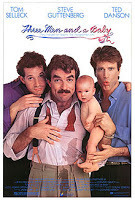
Most of us probably remember the 1987 comedy movie entitled "Three Men and a Baby." As much as I enjoyed this movie, which showed three single men doing their best to cope with the challenges of parenthood, this post has nothing to do with the show.
Instead, I'll be focusing on the apostle Paul's first letter to the Corinthian church. In this first letter, he mentions three types of men, and the differences in these three men all come down to what they choose to do with Jesus.
The Spiritual Man
We have not received the spirit of the world but the Spirit who is from God, that we may understand what God has freely given us. This is what we speak, not in words taught us by human wisdom but in words taught by the Spirit, expressing spiritual truths in spiritual words....The spiritual man makes judgments about all things, but he himself is not subject to any man’s judgment:
“For who has known the mind of the Lord
that he may instruct him?”
But we have the mind of Christ. ~1 Corinthians 2:12-13, 15-16 (NIV)
Notice these truths about the spiritual man:
He has God's Spirit, which enables him to understand spiritual truths and make judgments.
He has the mind of Christ.
The Unspiritual Man
The man without the Spirit does not accept the things that come from the Spirit of God, for they are foolishness to him, and he cannot understand them, because they are spiritually discerned. ~1 Corinthians 2:14 (NIV)
The man without Christ cannot have God's Spirit, so therefore he can't and won't accept the things that come from God's Spirit. Since he can't spiritually discern spiritual truths, they become foolish to him. This is a very common ailment among men. We tend to disparage what we don't understand.
The Worldly Man
Brothers, I could not address you as spiritual but as worldly—mere infants in Christ. I gave you milk, not solid food, for you were not yet ready for it. Indeed, you are still not ready. You are still worldly. For since there is jealousy and quarreling among you, are you not worldly? Are you not acting like mere men? ~1 Corinthians 3:1-3 (NIV)
When man refuses to apply what the Spirit reveals, he doesn't grow. Paul calls thesepeople babies. The proof of their lack of maturity is revealed in their behavior--specifically in jealousy and quarrels. Notice that these spiritual babies are in Christ, but they act like mere men. Because of their behavior it's difficult to tell the difference between this man and the unspiritual man who cannot discern the truths of God.
Application
We all have the same choice when it comes to God, and that choice centers around what we choose to do with the baby in the manger, the Son of God and the Savior of the world. To be spiritual men, we must choose to be obedient to Jesus so that we can grow in our faith. Unspiritual men must seek after God if they would understand the truth revealed by the Spirit. This requires belief in God's Son. It's all too easy to give in to our human tendencies, including jealousy and quarreling, but when we behave in such a way, it appears to the world that Christ has made no difference in our lives.
The choice is ours. What will we do with the baby?
Father God, thank You for the baby who came to the world--God incarnate--to make a way for us to be reconciled to You. May those who don't know You reach the place where they recognize Your sovereignty. May they exchange the foolishness of the world for the wisdom of God. Help us, Lord, to grow up in Christ. May we put aside the ways of the world in obedience to You. Thank You, Father, for giving us Your Spirit so that we might discern the things of God. In Jesus' Name, Amen.









Published on November 29, 2012 03:00
November 28, 2012
Guard Against Wisdom?
Wisdom is highly prized (and many times, sorely lacking) in our world today. At one time in my life, I foolishly assumed that wisdom was wisdom, no matter the source. Not so. In fact, the wisdom of the world can be a huge detriment to our spiritual lives.
Don't believe me? Then let's check a few examples from the Bible, starting with some of the greatest "thinkers" in history.
Now those who escorted Paul brought him as far as Athens; and receiving a command for Silas and Timothy to come to him as soon as possible, they left. Now while Paul was waiting for them at Athens, his spirit was being provoked within him as he was observing the city full of idols. So he was reasoning in the synagogue with the Jews and the God-fearing Gentiles, and in the market place every day with those who happened to be present. And also some of the Epicurean and Stoic philosophers were conversing with him. Some were saying, “What would this idle babbler wish to say?” Others, “He seems to be a proclaimer of strange deities,”—because he was preaching Jesus and the resurrection. And they took him and brought him to the Areopagus, saying, “May we know what this new teaching is which you are proclaiming? For you are bringing some strange things to our ears; so we want to know what these things mean.” (Now all the Athenians and the strangers visiting there used to spend their time in nothing other than telling or hearing something new.) ~Acts 17:15-21 (NASB)
Epicureans followed the teaching of Epicurus, a Greek philosopher who believed, like the hedonists, that pleasure was the greatest good. But unlike hedonism, followers of this philosophy attempted to achieve pleasure by living modestly, which supposedly would lead to a life free of fear and pain.
In contrast, the philosophy of the Stoics was based on the belief that moral and intellectual perfection could be reached, so that those who achieved this feat would never suffer from destructive emotions. Their teachings rested firmly on the human will as a way to reach virtue.
Though Athens was the center of human wisdom, Paul's spirit was very much troubled by the paganism that surrounded him. I find it very telling that though full of human wisdom, this great city of ancient Greece seemed devoid of the worship of the One True God.

A view of the Areopagus from the Acropolis
The Areopagus is a huge slab of marble where the great thinkers of the day would meet to discuss and debate the latest thoughts and ideas. I can almost see them pulling Paul atop the giant rock, curious about this traveler with the dust of the ancient world on his feet and the gospel of Jesus' resurrection on his lips. Perhaps they looked down their long noses at him, intent on making sport of him. They had no idea what they'd gotten themselves into...
Paul proceeded to bring up their statue to the unknown God, by introducing them to the One True God. As is usually the case, the results were mixed. Some sneered, but some believed (Acts 17:22-34).
Worldly Wisdom vs. God's Wisdom
Later, when Paul addressed the church at Corinth, he once more broached the subject of man's wisdom compared to the wisdom that comes from God. Enjoy these nuggets of wisdom that he preached to the Corinthians.
1. Human wisdom empties Christ's cross of its power.
For Christ did not send me to baptize, but to preach the gospel—not with words of human wisdom, lest the cross of Christ be emptied of its power. ~1 Corinthians 1:17 (NIV)
2. God destroys the wisdom and intelligence of man by the message of the cross, which seems foolish to those with worldly wisdom.
For the message of the cross is foolishness to those who are perishing, but to us who are being saved it is the power of God. For it is written:
“I will destroy the wisdom of the wise;
the intelligence of the intelligent I will frustrate.”
Where is the wise man? Where is the scholar? Where is the philosopher of this age? Has not God made foolish the wisdom of the world? For since in the wisdom of God the world through its wisdom did not know him, God was pleased through the foolishness of what was preached to save those who believe. Jews demand miraculous signs and Greeks look for wisdom, but we preach Christ crucified: a stumbling block to Jews and foolishness to Gentiles, but to those whom God has called, both Jews and Greeks, Christ the power of God and the wisdom of God. ~1 Corinthians 1:18-24 (NIV)
3. God's foolishness is wiser than man's wisdom (In other words, there's no comparison.)
For the foolishness of God is wiser than man’s wisdom, and the weakness of God is stronger than man’s strength. Brothers, think of what you were when you were called. Not many of you were wise by human standards; not many were influential; not many were of noble birth. But God chose the foolish things of the world to shame the wise; God chose the weak things of the world to shame the strong. ~1 Corinthians 1:25-27 (NIV)
4. God's wisdom is revealed through His Spirit to those who believe.
We do, however, speak a message of wisdom among the mature, but not the wisdom of this age or of the rulers of this age, who are coming to nothing. No, we speak of God’s secret wisdom, a wisdom that has been hidden and that God destined for our glory before time began. None of the rulers of this age understood it, for if they had, they would not have crucified the Lord of glory. However, as it is written:
“No eye has seen,
no ear has heard,
no mind has conceived
what God has prepared for those who love him”—
but God has revealed it to us by his Spirit. The Spirit searches all things, even the deep things of God. For who among men knows the thoughts of a man except the man’s spirit within him? In the same way no one knows the thoughts of God except the Spirit of God. We have not received the spirit of the world but the Spirit who is from God, that we may understand what God has freely given us. This is what we speak, not in words taught us by human wisdom but in words taught by the Spirit, expressing spiritual truths in spiritual words. ~1 Corinthians 2:6-13 (NIV)
5. The world's "wisdom" is futile and foolish.
Do not deceive yourselves. If any one of you thinks he is wise by the standards of this age, he should become a “fool” so that he may become wise. For the wisdom of this world is foolishness in God’s sight. As it is written: “He catches the wise in their craftiness”; and again, “The Lord knows that the thoughts of the wise are futile.” ~1 Corinthians 3:18-20 (NIV)
In conclusion, all that claims to be wisdom isn't true wisdom, because true wisdom comes only from God. If you want to be wise, the only course of action is to humble yourself before the Creator and Sustainer of the universe, God Almighty. He, and He alone, is the source of true wisdom, and you'll never reach it without Him.
But if any of you lacks wisdom, let him ask of God, who gives to all generously and without reproach, and it will be given to him. ~James 1:5 (NASB)
Almighty Father, thank You that You have revealed Your truth to the foolish ones of this age. Thank You that true wisdom can only be found in knowing You. May we shun the foolishness of those in our world who find faith foolish, and instead ground ourselves in You, Your power, and Your wisdom. Amen.









Don't believe me? Then let's check a few examples from the Bible, starting with some of the greatest "thinkers" in history.
Now those who escorted Paul brought him as far as Athens; and receiving a command for Silas and Timothy to come to him as soon as possible, they left. Now while Paul was waiting for them at Athens, his spirit was being provoked within him as he was observing the city full of idols. So he was reasoning in the synagogue with the Jews and the God-fearing Gentiles, and in the market place every day with those who happened to be present. And also some of the Epicurean and Stoic philosophers were conversing with him. Some were saying, “What would this idle babbler wish to say?” Others, “He seems to be a proclaimer of strange deities,”—because he was preaching Jesus and the resurrection. And they took him and brought him to the Areopagus, saying, “May we know what this new teaching is which you are proclaiming? For you are bringing some strange things to our ears; so we want to know what these things mean.” (Now all the Athenians and the strangers visiting there used to spend their time in nothing other than telling or hearing something new.) ~Acts 17:15-21 (NASB)
Epicureans followed the teaching of Epicurus, a Greek philosopher who believed, like the hedonists, that pleasure was the greatest good. But unlike hedonism, followers of this philosophy attempted to achieve pleasure by living modestly, which supposedly would lead to a life free of fear and pain.
In contrast, the philosophy of the Stoics was based on the belief that moral and intellectual perfection could be reached, so that those who achieved this feat would never suffer from destructive emotions. Their teachings rested firmly on the human will as a way to reach virtue.
Though Athens was the center of human wisdom, Paul's spirit was very much troubled by the paganism that surrounded him. I find it very telling that though full of human wisdom, this great city of ancient Greece seemed devoid of the worship of the One True God.

A view of the Areopagus from the Acropolis
The Areopagus is a huge slab of marble where the great thinkers of the day would meet to discuss and debate the latest thoughts and ideas. I can almost see them pulling Paul atop the giant rock, curious about this traveler with the dust of the ancient world on his feet and the gospel of Jesus' resurrection on his lips. Perhaps they looked down their long noses at him, intent on making sport of him. They had no idea what they'd gotten themselves into...
Paul proceeded to bring up their statue to the unknown God, by introducing them to the One True God. As is usually the case, the results were mixed. Some sneered, but some believed (Acts 17:22-34).
Worldly Wisdom vs. God's Wisdom
Later, when Paul addressed the church at Corinth, he once more broached the subject of man's wisdom compared to the wisdom that comes from God. Enjoy these nuggets of wisdom that he preached to the Corinthians.
1. Human wisdom empties Christ's cross of its power.
For Christ did not send me to baptize, but to preach the gospel—not with words of human wisdom, lest the cross of Christ be emptied of its power. ~1 Corinthians 1:17 (NIV)
2. God destroys the wisdom and intelligence of man by the message of the cross, which seems foolish to those with worldly wisdom.
For the message of the cross is foolishness to those who are perishing, but to us who are being saved it is the power of God. For it is written:
“I will destroy the wisdom of the wise;
the intelligence of the intelligent I will frustrate.”
Where is the wise man? Where is the scholar? Where is the philosopher of this age? Has not God made foolish the wisdom of the world? For since in the wisdom of God the world through its wisdom did not know him, God was pleased through the foolishness of what was preached to save those who believe. Jews demand miraculous signs and Greeks look for wisdom, but we preach Christ crucified: a stumbling block to Jews and foolishness to Gentiles, but to those whom God has called, both Jews and Greeks, Christ the power of God and the wisdom of God. ~1 Corinthians 1:18-24 (NIV)
3. God's foolishness is wiser than man's wisdom (In other words, there's no comparison.)
For the foolishness of God is wiser than man’s wisdom, and the weakness of God is stronger than man’s strength. Brothers, think of what you were when you were called. Not many of you were wise by human standards; not many were influential; not many were of noble birth. But God chose the foolish things of the world to shame the wise; God chose the weak things of the world to shame the strong. ~1 Corinthians 1:25-27 (NIV)
4. God's wisdom is revealed through His Spirit to those who believe.
We do, however, speak a message of wisdom among the mature, but not the wisdom of this age or of the rulers of this age, who are coming to nothing. No, we speak of God’s secret wisdom, a wisdom that has been hidden and that God destined for our glory before time began. None of the rulers of this age understood it, for if they had, they would not have crucified the Lord of glory. However, as it is written:
“No eye has seen,
no ear has heard,
no mind has conceived
what God has prepared for those who love him”—
but God has revealed it to us by his Spirit. The Spirit searches all things, even the deep things of God. For who among men knows the thoughts of a man except the man’s spirit within him? In the same way no one knows the thoughts of God except the Spirit of God. We have not received the spirit of the world but the Spirit who is from God, that we may understand what God has freely given us. This is what we speak, not in words taught us by human wisdom but in words taught by the Spirit, expressing spiritual truths in spiritual words. ~1 Corinthians 2:6-13 (NIV)
5. The world's "wisdom" is futile and foolish.
Do not deceive yourselves. If any one of you thinks he is wise by the standards of this age, he should become a “fool” so that he may become wise. For the wisdom of this world is foolishness in God’s sight. As it is written: “He catches the wise in their craftiness”; and again, “The Lord knows that the thoughts of the wise are futile.” ~1 Corinthians 3:18-20 (NIV)
In conclusion, all that claims to be wisdom isn't true wisdom, because true wisdom comes only from God. If you want to be wise, the only course of action is to humble yourself before the Creator and Sustainer of the universe, God Almighty. He, and He alone, is the source of true wisdom, and you'll never reach it without Him.
But if any of you lacks wisdom, let him ask of God, who gives to all generously and without reproach, and it will be given to him. ~James 1:5 (NASB)
Almighty Father, thank You that You have revealed Your truth to the foolish ones of this age. Thank You that true wisdom can only be found in knowing You. May we shun the foolishness of those in our world who find faith foolish, and instead ground ourselves in You, Your power, and Your wisdom. Amen.









Published on November 28, 2012 03:00
November 27, 2012
"12 Days of Christmas" Starts December 1st

In anticipation of my favorite time of the year, WordVessel is hosting a gigantic giveaway starting December 1st. Since music is a big part of my life, I've entitled it the "12 Days of Christmas." The number of prizes for each day depends on the total number of entries, so the more people who participate, the more prizes! In addition, prizes are transferable, so if you win something you already have you can send it on to a friend as a Christmas gift.
Here's a breakdown of the prizes:
Dec. 1: Texas Roads eBook
Dec. 2: A Path Less Traveled eBook
Dec. 3: The Way of Grace eBook
Dec. 4: Texas Roads & A Path Less Traveled eBooks
Dec. 5: Texas Roads, A Path Less Traveled, & The Way of Grace eBooks
Dec. 6: Texas Roads print copy
Dec. 7: A Path Less Traveled print copy
Dec. 8: The Way of Grace print copy
Dec. 9: Texas Roads & A Path Less Traveled print copies
Dec. 10: Texas Roads, A Path Less Traveled & The Way of Grace print copies
Dec. 11: $50 Amazon gift card
Dec. 12: Kindle eReader
Here are the rules:
Must leave a comment which includes your e-mail address to be entered in the drawing.
Winners will be chosen via www.Random.org website at 10 p.m. each day (CST) and announced the following day.
Prizes are transferable.
Extra chances to win will be listed with each day of giveaways, so you can enter more than once.
The number of prizes each day depends on the number of entries for that day. (Possible example: 1-30 entries=1 copy given away; 31-60 entries=2 copies given away; etc.)
Be sure to check back each day beginning December first to enter the drawings, and please help spread the word so we can have lots of entries!
Merry Christmas!










Published on November 27, 2012 03:00
November 26, 2012
Interview with Author Steve Rzasa (& Book Giveaway!)
 WordVessel is delighted to welcome author Steve Rzasa today in celebration of his most recent launch for his book, Crosswind. Here's his bio:
WordVessel is delighted to welcome author Steve Rzasa today in celebration of his most recent launch for his book, Crosswind. Here's his bio:
Steve Rzasa is a librarian
in Buffalo, Wyoming who fills his head with Scripture, history, graphic novels,
and TV shows like Castle and Big Bang Theory, ideally in that
order. Steve has had three science-fiction books published by Marcher Lord
Press: The Word Reclaimed (2009), its sequel, The Word Unleashed (2010),
and Broken Sight (2011), which won the 2012 Carol Award for
Speculative Fiction from the American Christian Fiction Writers. Crosswind
is his fourth novel.
More
information about Steve’s books is available at www.steverzasa.com and www.marcherlordpress.com
Steve, what makes your new novel
different from your previous works?
Well,
Crosswind is a departure from the science-fiction/space opera I’ve written.
It’s a steampunk fantasy, meaning it’s set in an imaginary world in which the
vehicles of the day are driven primarily by steam power—the airplanes,
dirigibles and predecessors to cars. All the action takes place within a very
small geographic area compared to my interstellar adventures. But what remains
the same is that it’s an adventure that involves family, something I try to
include in all my novels.
Where do you get your ideas?
Well,
I just kind of daydream, I guess. A lot of times I happen to think of a scene
or a combination of characters – or a fantasy city-state – and then it all kind
of flows from there. Once I put pen to paper and write down that idea, more
ideas seem to come naturally. But many times I troll through the current events
and see what can be adapted as a future plot. For example, with Crosswind, I came up with the mountain range surrounding the
city-state of Perch when my children and I were playing atop a huge snowpile
pushed up by snowplows.
How does your faith impact your
writing?
My
faith drives me to present what I believe about God rather directly. It
enhances my creativity and gives me the freedom to address topics not
necessarily just for a secular or Christian audience.
What’s the biggest surprise about
being a published author?
The
biggest surprise was that people other than my family and friends read my books
and liked them! I’ve been gratified that men and women of varying ages – from
70s right on down to middle school – have enjoyed reading all three of my
novels. And now my son, who’s going to be 10 in March, wants to read Crosswind. I told him he’d have to wait
a while.
What do you think about writing
contests? Have you participated in any? What’s the benefit to an unpublished
writer?
Most
recently, my third novel, Broken Sight,
won the Carol Award for Speculative Fiction from ACFW and my flash fiction
piece In the Bag took the grand prize
in a contest held by HIS Writers (Northern Colorado Chapter, ACFW). It serves,
I think, as a way to show potential publishers that an unbiased source read and
liked your work, so I would encourage submitting to such contests.
What’s coming up next?
I have a sequel to Crosswind,
working title Desert Scourge,
finished and ready for another round of edits. It may be published this summer.
Plus, I’m working on a third Sark brothers tale and have a sci-fi project that
is a complete departure from the writing I’ve done before.
Thanks so much for being with us today, Steve. We enjoyed getting to learn more about you and your books. Readers, Steve has graciously offered a copy of Crosswind to one of you lucky readers. Please leave a comment with your e-mail address so that we can contact the winner (chosen through Random.org). Here's the book blurb:
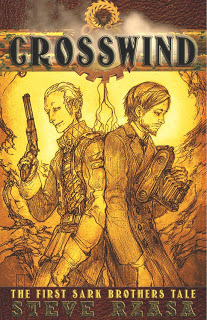
Crosswind
The
First Sark Brothers Tale
It’s been almost five hundred
years since the collapse of the Great Commonwealth. The plagues left folk few
and far between. City-states rule the continent of Galderica. There’s coin to
be had in trade— whether you take your wares by aeroplane or ride them over the
rails.
Winchell Sark has a fine life as
a reporter for the Perch Advocate newspaper, a good family at home and a faith
that seems downright peculiar to most everyone else. So when he is called out
to investigate a biplane crash at the foot of Perch, the finest center of
aviation in the Sawtooth Mountains, he doesn’t think much of it.
But there are dark powers at
work—powers that have their eye on Perch. Powers that mankind long thought
consigned to the trash heap of mythology. ’Cept they were wrong.
It’s up to Winch and his brother,
Copernicus, a hotshot pilot, to save their people—and it ain’t going to be
easy.









Published on November 26, 2012 09:54
November 23, 2012
Overcoming Fear
On a recent sleepover, my three-year-old grandson Harrisen and I went outside early one morning to gather the eggs. Unfortunately, a stray dog showed up just as we finished, which sent Harrisen into a panic attack, complete with tears and screaming. I finally managed to balance him in one arm and the basket of eggs in the other as I attempted to shoo the over-friendly dog away and make it inside the house.
A little while later, after several unsuccessful attempts to get Harrisen to come outside and enjoy the beautiful fall day, I had to basically force him to get over his irrational fear. I picked him up and carried him outside in spite of his protests, explaining that Nana had shooed the dog away and that even if he came back, I would protect him.
As I tried to encourage him and help him get over his fears, I realized that I am sometimes very much like my grandson, even though I'm fifty-something. No matter our age, we all experience fear, and our fears are often irrational. Because of prior bad experiences, we're afraid to "get back on the horse" again, fearful of a repeat experience.
But the Bible clearly admonishes us in several places to not be afraid and informs us that God hasn't given us a spirit of fear. Fear reveals a lack of trust in our heavenly Father, who has promised to always be with us, has proved His love for us, has cared and provided for us over and over again.
I can almost picture Jesus gathering me into His arms, telling me that He will protect me so I have no reason to be afraid. I can hear Him telling me that He's shooed the source of my fear away and that even if it returns He'll be right beside me. I feel the encouragement as He helps me move past my fear. Hallelujah that we serve such a wonderful Savior!
Thank You, Lord Jesus, that we have no reason to be afraid because of Your presence, guidance, and help. Teach us to trust You more so that we might overcome our fears. In Jesus' name, Amen.









A little while later, after several unsuccessful attempts to get Harrisen to come outside and enjoy the beautiful fall day, I had to basically force him to get over his irrational fear. I picked him up and carried him outside in spite of his protests, explaining that Nana had shooed the dog away and that even if he came back, I would protect him.
As I tried to encourage him and help him get over his fears, I realized that I am sometimes very much like my grandson, even though I'm fifty-something. No matter our age, we all experience fear, and our fears are often irrational. Because of prior bad experiences, we're afraid to "get back on the horse" again, fearful of a repeat experience.
But the Bible clearly admonishes us in several places to not be afraid and informs us that God hasn't given us a spirit of fear. Fear reveals a lack of trust in our heavenly Father, who has promised to always be with us, has proved His love for us, has cared and provided for us over and over again.
I can almost picture Jesus gathering me into His arms, telling me that He will protect me so I have no reason to be afraid. I can hear Him telling me that He's shooed the source of my fear away and that even if it returns He'll be right beside me. I feel the encouragement as He helps me move past my fear. Hallelujah that we serve such a wonderful Savior!
Thank You, Lord Jesus, that we have no reason to be afraid because of Your presence, guidance, and help. Teach us to trust You more so that we might overcome our fears. In Jesus' name, Amen.









Published on November 23, 2012 03:00
November 22, 2012
The Great Exchange
During this season of Thanksgiving, it's so easy to focus on our temporal blessings, the things that can literally be here today and gone tomorrow. I pray that I never forget to be grateful for the blessings of God that stretch far beyond this earthly realm.
This year, God has made me aware of the great exchange plan He offers to all who place their faith and trust in Him. It is the best return on investment that I have ever seen.
Exchange #1 - Our Sin For His Righteousness
He made Him who knew no sin to be sin on our behalf, so that we might become the righteousness of God in Him. ~2 Corinthians 5:21 (NASB)
Imagine, if you will, two enormous buckets. One is filled to the brim with your sin. Sins of omission, not doing what you know you should, and sins of commission, doing what we know we shouldn't. The other is filled to the brim of the righteousness of God. Envision Jesus taking your bucket of filth and giving you His bucket of goodness. Pretty mind-boggling, isn't it? Yes, that's how much He loves us. If that doesn't make your heart sing with gratitude then nothing will.
Exchange #2 - Our Weakness For His Strength
Do you not know? Have you not heard? The Everlasting God, the Lord, the Creator of the ends of the earth does not become weary or tired. His understanding is inscrutable. He gives strength to the weary, and to him who lacks might He increases power. Though youths grow weary and tired, and vigorous young men stumble badly, yet those who wait for the Lord will gain new strength; they will mount up with wings like eagles, they will run and not get tired, they will walk and not become weary. ~Isaiah 40:28-31 (NASB)
And He has said to me, “My grace is sufficient for you, for power is perfected in weakness.” Most gladly, therefore, I will rather boast about my weaknesses, so that the power of Christ may dwell in me. Therefore I am well content with weaknesses, with insults, with distresses, with persecutions, with difficulties, for Christ’s sake; for when I am weak, then I am strong. ~2 Corinthians 12:9-10 (NASB)
It doesn't take long for me to realize my own weakness when I try to do things in my own strength. It's much like trying to teach a pig to sing. (It doesn't work and annoys the pig.) Praise God for the strength that He gives! Are you aware that the same power that raised Christ from the dead lives inside us? Another reason to be grateful to the LORD!
Exchange #3 - Our Cares & Burdens For His Peace
Therefore humble yourselves under the mighty hand of God, that He may exalt you at the proper time, casting all your anxiety on Him, because He cares for you. ~1 Peter 5:6-7 (NASB)
Cast your burden upon the Lord and He will sustain you; He will never allow the righteous to be shaken. ~Psalm 55:22 (NASB)
Peace I leave with you; My peace I give to you; not as the world gives do I give to you. Do not let your heart be troubled, nor let it be fearful. ~John 14:27 (NASB)
Be anxious for nothing, but in everything by prayer and supplication with thanksgiving let your requests be made known to God. And the peace of God, which surpasses all comprehension, will guard your hearts and your minds in Christ Jesus. ~Philippians 4:6-7(NASB)
If there's anything our mad, fast-paced world needs, it's peace. Thank God that He has provided us an unlimited supply of His perfect peace. We have no need to be worried, fearful, or burdened, because our God reigns. He provides all that we need and more. Thank You, LORD!
Father God, our hearts overflow with gratitude to You for Your goodness and Your many blessings. Thank You that You were willing to take our sin and replace it with Your righteousness so that we can stand with confidence in Your presence. Thank You for giving us Your amazing power and strength for our human weakness and frailty. Thank You for taking our cares and burdens and replacing it with Your unfathomable peace. We are so blessed to belong to You. Praise and honor and glory to our King forever and ever! Amen.









This year, God has made me aware of the great exchange plan He offers to all who place their faith and trust in Him. It is the best return on investment that I have ever seen.
Exchange #1 - Our Sin For His Righteousness
He made Him who knew no sin to be sin on our behalf, so that we might become the righteousness of God in Him. ~2 Corinthians 5:21 (NASB)
Imagine, if you will, two enormous buckets. One is filled to the brim with your sin. Sins of omission, not doing what you know you should, and sins of commission, doing what we know we shouldn't. The other is filled to the brim of the righteousness of God. Envision Jesus taking your bucket of filth and giving you His bucket of goodness. Pretty mind-boggling, isn't it? Yes, that's how much He loves us. If that doesn't make your heart sing with gratitude then nothing will.
Exchange #2 - Our Weakness For His Strength
Do you not know? Have you not heard? The Everlasting God, the Lord, the Creator of the ends of the earth does not become weary or tired. His understanding is inscrutable. He gives strength to the weary, and to him who lacks might He increases power. Though youths grow weary and tired, and vigorous young men stumble badly, yet those who wait for the Lord will gain new strength; they will mount up with wings like eagles, they will run and not get tired, they will walk and not become weary. ~Isaiah 40:28-31 (NASB)
And He has said to me, “My grace is sufficient for you, for power is perfected in weakness.” Most gladly, therefore, I will rather boast about my weaknesses, so that the power of Christ may dwell in me. Therefore I am well content with weaknesses, with insults, with distresses, with persecutions, with difficulties, for Christ’s sake; for when I am weak, then I am strong. ~2 Corinthians 12:9-10 (NASB)
It doesn't take long for me to realize my own weakness when I try to do things in my own strength. It's much like trying to teach a pig to sing. (It doesn't work and annoys the pig.) Praise God for the strength that He gives! Are you aware that the same power that raised Christ from the dead lives inside us? Another reason to be grateful to the LORD!
Exchange #3 - Our Cares & Burdens For His Peace
Therefore humble yourselves under the mighty hand of God, that He may exalt you at the proper time, casting all your anxiety on Him, because He cares for you. ~1 Peter 5:6-7 (NASB)
Cast your burden upon the Lord and He will sustain you; He will never allow the righteous to be shaken. ~Psalm 55:22 (NASB)
Peace I leave with you; My peace I give to you; not as the world gives do I give to you. Do not let your heart be troubled, nor let it be fearful. ~John 14:27 (NASB)
Be anxious for nothing, but in everything by prayer and supplication with thanksgiving let your requests be made known to God. And the peace of God, which surpasses all comprehension, will guard your hearts and your minds in Christ Jesus. ~Philippians 4:6-7(NASB)
If there's anything our mad, fast-paced world needs, it's peace. Thank God that He has provided us an unlimited supply of His perfect peace. We have no need to be worried, fearful, or burdened, because our God reigns. He provides all that we need and more. Thank You, LORD!
Father God, our hearts overflow with gratitude to You for Your goodness and Your many blessings. Thank You that You were willing to take our sin and replace it with Your righteousness so that we can stand with confidence in Your presence. Thank You for giving us Your amazing power and strength for our human weakness and frailty. Thank You for taking our cares and burdens and replacing it with Your unfathomable peace. We are so blessed to belong to You. Praise and honor and glory to our King forever and ever! Amen.









Published on November 22, 2012 07:30
November 21, 2012
Happy Thanksgiving!
Here are just a few of the things I'm thankful to the Lord for this year. (This list is by no means exhaustive, nor is it necessarily in order.)

Our time at Arkansas Baptist Boys' Ranch

My chickens and rooster--even when he attacks me trying to guard "his" territory!

Our candy machine business (and my hubby who does all the leg work so I can write)

Our country - "One Nation, Under God"
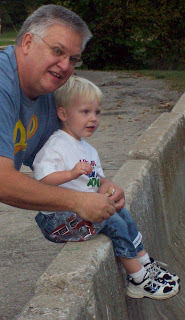
The ability to be close to our grandson!

Special times with H!

The beauty of our new earthly home.
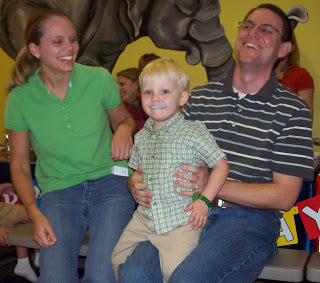
Fun times! Here H decided to take a bite out of his cake after he blew out the candles! =)
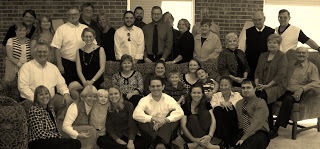
Being with family!

Our crew! My favorite peeps on the planet!

Our little homestead...

Finally finishing Book 3 in the Miller's Creek novels!

And most importantly, the work Jesus did at the cross to purchase my redemption, assure me of direct access to my Father, and secure my place in heaven. Hallelujah! What a Savior!
HAPPY THANKSGIVING!!!











Our time at Arkansas Baptist Boys' Ranch

My chickens and rooster--even when he attacks me trying to guard "his" territory!

Our candy machine business (and my hubby who does all the leg work so I can write)

Our country - "One Nation, Under God"

The ability to be close to our grandson!

Special times with H!

The beauty of our new earthly home.

Fun times! Here H decided to take a bite out of his cake after he blew out the candles! =)

Being with family!

Our crew! My favorite peeps on the planet!

Our little homestead...

Finally finishing Book 3 in the Miller's Creek novels!

And most importantly, the work Jesus did at the cross to purchase my redemption, assure me of direct access to my Father, and secure my place in heaven. Hallelujah! What a Savior!
HAPPY THANKSGIVING!!!









Published on November 21, 2012 03:00
November 20, 2012
Novel Writing 101 - Bright Beginnings
So you've got an idea you think would make a great story. But how do you go about developing that idea into a full-blown novel? Well, first you might want to take a peek at an overview article I wrote on story structure. Hopefully it will help you get the big picture.
But you'll also want to tune in to these next three articles where I go into a little bit deeper detail. We'll start with Bright Beginnings, then head to the Must-Have Middles, and end with Engaging Endings. Hopefully the combination will help you develop your idea into a novel.
Ordinary World
The story always starts off in a character's ordinary world, but on the edge of change. In Episode IV of Star Wars (the first one to come out), we see Luke on his home planet Tatooine. In It's A Wonderful Life , we meet George Bailey as both a boy and young man in Bedford Falls. In Gone With the Wind , we first get a glimpse of Scarlett O'Hara as the coquettish daughter of an Irish plantation owner. Showing this ordinary world sets up the world of the story.
Set the Mood
The opening image of your novel should set the stage for what kind of story it will be. Who can forget the opening scene of Silence of the Lambs , with Clarice running through a misty forest? That first visual image effectively sets the stage for the entrance of Hannibal Lector.
Main Character's Story Goal, Motivation, and Conflict
The main character must have a goal or there is no story. He or she should have an inner and outer desire. For example, in my first book, Texas Roads , Dani plans to start over in a new town--that's her outer goal. But inside, she wants to find a place that feels like home--her inner desire.
In addition to the goal, the reader wants to know why (the motivation) the character wants what she wants. There must also be something (or several somethings, actually) that stands in the way of the main character and her goal. Though the antagonist won't be fully revealed until Act 2, there will be hints of the antagonistic force in Act 1. And the antagonist will be the major source of conflict throughout the story.
Call to Adventure/Inciting Incident
Something will occur that leads the character to make a change, which will be the jumping off point into Act 2. In The Wizard of Oz , this occurs when the tornado picks up Dorothy's Kansas house and dumps it in the land of Oz on top of a witch wearing ruby slippers.
Refusal of the Call
In most stories, the hero/heroine will go through a time of at least questioning the call, if not downright refusing. In the third book in the Miller's Creek series, The Way of Grace , Gracie hesitates about taking the prosecution position (though it's what she's always wanted), until she learns that someone she cares about could be in danger.
Initial Meeting of the Love Interest
If your story is a romance, the hero and heroine MUST meet in this first section of the book, preferably in the first chapter. In addition to their meeting, there must be something that makes them ready for a romance, as well as plenty of reasons why neither is particularly interested in the other--kind of a "I don't like you, but I do like you" kind of thing to keep things interesting.
Hope you find this information useful in your own novel endeavors. I love chatting with other writers, so if you have a question or comment please leave it below!
Happy Writing!











But you'll also want to tune in to these next three articles where I go into a little bit deeper detail. We'll start with Bright Beginnings, then head to the Must-Have Middles, and end with Engaging Endings. Hopefully the combination will help you develop your idea into a novel.
Ordinary World
The story always starts off in a character's ordinary world, but on the edge of change. In Episode IV of Star Wars (the first one to come out), we see Luke on his home planet Tatooine. In It's A Wonderful Life , we meet George Bailey as both a boy and young man in Bedford Falls. In Gone With the Wind , we first get a glimpse of Scarlett O'Hara as the coquettish daughter of an Irish plantation owner. Showing this ordinary world sets up the world of the story.
Set the Mood
The opening image of your novel should set the stage for what kind of story it will be. Who can forget the opening scene of Silence of the Lambs , with Clarice running through a misty forest? That first visual image effectively sets the stage for the entrance of Hannibal Lector.
Main Character's Story Goal, Motivation, and Conflict
The main character must have a goal or there is no story. He or she should have an inner and outer desire. For example, in my first book, Texas Roads , Dani plans to start over in a new town--that's her outer goal. But inside, she wants to find a place that feels like home--her inner desire.
In addition to the goal, the reader wants to know why (the motivation) the character wants what she wants. There must also be something (or several somethings, actually) that stands in the way of the main character and her goal. Though the antagonist won't be fully revealed until Act 2, there will be hints of the antagonistic force in Act 1. And the antagonist will be the major source of conflict throughout the story.
Call to Adventure/Inciting Incident
Something will occur that leads the character to make a change, which will be the jumping off point into Act 2. In The Wizard of Oz , this occurs when the tornado picks up Dorothy's Kansas house and dumps it in the land of Oz on top of a witch wearing ruby slippers.
Refusal of the Call
In most stories, the hero/heroine will go through a time of at least questioning the call, if not downright refusing. In the third book in the Miller's Creek series, The Way of Grace , Gracie hesitates about taking the prosecution position (though it's what she's always wanted), until she learns that someone she cares about could be in danger.
Initial Meeting of the Love Interest
If your story is a romance, the hero and heroine MUST meet in this first section of the book, preferably in the first chapter. In addition to their meeting, there must be something that makes them ready for a romance, as well as plenty of reasons why neither is particularly interested in the other--kind of a "I don't like you, but I do like you" kind of thing to keep things interesting.
Hope you find this information useful in your own novel endeavors. I love chatting with other writers, so if you have a question or comment please leave it below!
Happy Writing!










Published on November 20, 2012 03:00
CatBryant.com ~ Journey Blog
FREE digital copy of A PATH LESS TRAVELED (2nd stand-alone book in the Miller's Creek novels and an Amazon Kindle Best-Seller) when you subscribe to Cathy's FROM MY FRONT PORCH newsletter. On my blog
FREE digital copy of A PATH LESS TRAVELED (2nd stand-alone book in the Miller's Creek novels and an Amazon Kindle Best-Seller) when you subscribe to Cathy's FROM MY FRONT PORCH newsletter. On my blog I write about life in general, though most of my posts tend to be book-related or devotional in nature. I'd love to have you drop by for a visit, where you can sign up for blog posts (via e-mail or RSS) Hope to see you at http://www.CatBryant.com!
...more
- Cathy Bryant's profile
- 390 followers

















